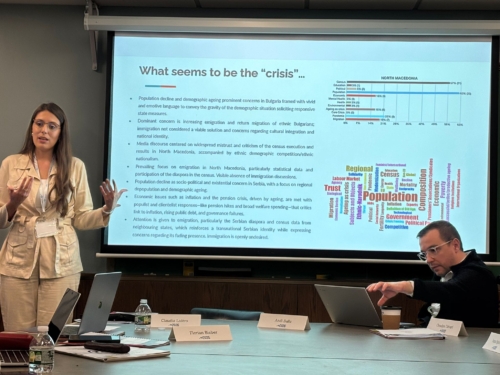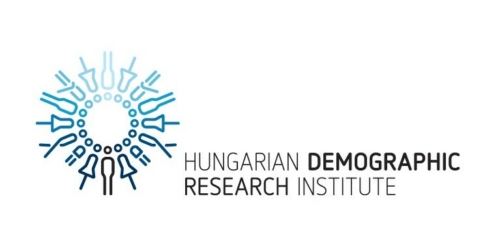PhD students at ASN World Convention 2025
22 to 24 May 2025, New York
29th Annual World Convention of the Association for the Study of Nationalities (ASN)
Co-hosted by the Harriman Institute, Columbia University
As part of the 2025 ASN World Convention, held from May 22 to 24 in New York, three PhD students from our project organized and participated in the panel “Ageing and Demographic Nationalism in Southeast Europe.” The panel brought together case studies from Albania, Hungary, and a regional comparison of Bulgaria, North Macedonia, and Serbia. Florian Bieber (Centre for Southeast European Studies, University of Graz) served as discussant.
The panel examined how public and media narratives in the region frame demographic decline and ageing populations, with a particular focus on the intersections of emigration, nationalism, and the representation — or absence — of older adults in discourse.
Demographic Decline, Ageing, and Nationalist Discourses in Southeast Europe
This timely and thought-provoking panel addressed the growing demographic anxiety across Southeast Europe, focusing on the complex intersections between ageing populations, emigration, and nationalist discourses. The three papers presented offered compelling insights into how media narratives and public discourses frame ageing and demographic shifts as pressing societal challenges, often through lenses of economic sustainability and national identity.
Andi Balla’s (Leibniz Institute for East and Southeast European Studies, Regensburg) paper, “Demographic Anxiety in Albania: Impact of Emigration on a Rapidly Aging Society,” examined the profound demographic changes Albania has experienced in recent years, particularly a sharp population decline driven by emigration and declining birth rates. The country lost at least 14% of its population between the 2011 and 2023 censuses, and the median age rose by more than seven years. Through a discourse analysis of media coverage surrounding the 2023 census and the International Day of Older Persons, Balla identified dominant themes of economic insecurity, concern over pension sustainability, and institutional inaction. While youth out-migration is a key focus, the experiences and wellbeing of older adults remain marginal in the discourse.
Orsolya Udvari (Hungarian Demographic Research Institute and Doctoral School of Sociology and Communication Sciences, Corvinus University of Budapest), presenting findings from a joint paper with Julianna Boros, Judit Monostori, and Attila Melegh, discussed “Exploring Ageing in Population Discourses: A Media Analysis from Hungary.” Based on 60 articles from Hungarian online media, the study developed a typology of discourses around ageing and population. The findings showed a media environment where ageing is primarily framed through economic and demographic concerns — such as pension reform, care system sustainability, and depopulation. Discourses on demographic nationalism are prominent, often linked to anxieties around immigration and national decline, while the heterogeneity of older people and emerging social models of ageing are largely underrepresented.
Orsolya Udvari presents her analysis of Hungarian media coverages
Ivana Spirovska’s (Centre for Southeast European Studies, University of Graz) paper, “The ‘Apocalypse’: Demographic Nationalism and Ageing Amidst Population Decline in Bulgaria, North Macedonia and Serbia,” offered a regional comparative perspective. Her analysis focused on media narratives responding to census releases and the International Day of Older Persons. In all three countries, demographic ageing is framed as a crisis, frequently infused with nationalist overtones. Media discourses emphasize birth rate decline, national identity, and the need for population renewal through pro-natalist and anti-immigration rhetoric. In North Macedonia, these themes are often entangled with inter-ethnic dynamics, while in Bulgaria and Serbia, demographic change is portrayed as a fundamental threat to national viability.
Ivana Spirovska (l.) presenting, with Andi Balla (r.) during the discussion
The panel discussion highlighted both the content and structure of demographic discourses across the region. A recurring theme was not only what is present in public narratives — economic fears, nationalist responses, and policy alarmism — but also what is absent. Across all three case studies, there is a notable silence around care work, intergenerational solidarity, and the social and emotional dimensions of ageing. Older adults are often represented abstractly, as demographic indicators or fiscal burdens, rather than as active social participants. Discussions pointed to the need for more inclusive and multidimensional representations of ageing in public discourse.
The panelists (f.l.t.r.): Andi Balla, Florian Bieber, Orsolya Udvari, and Ivana Spirovska
The participation of our team members in the ASN 2025 Convention was funded by the Volkswagen Foundation as part of the project “Transforming Anxieties of Ageing in Southeastern Europe.”








